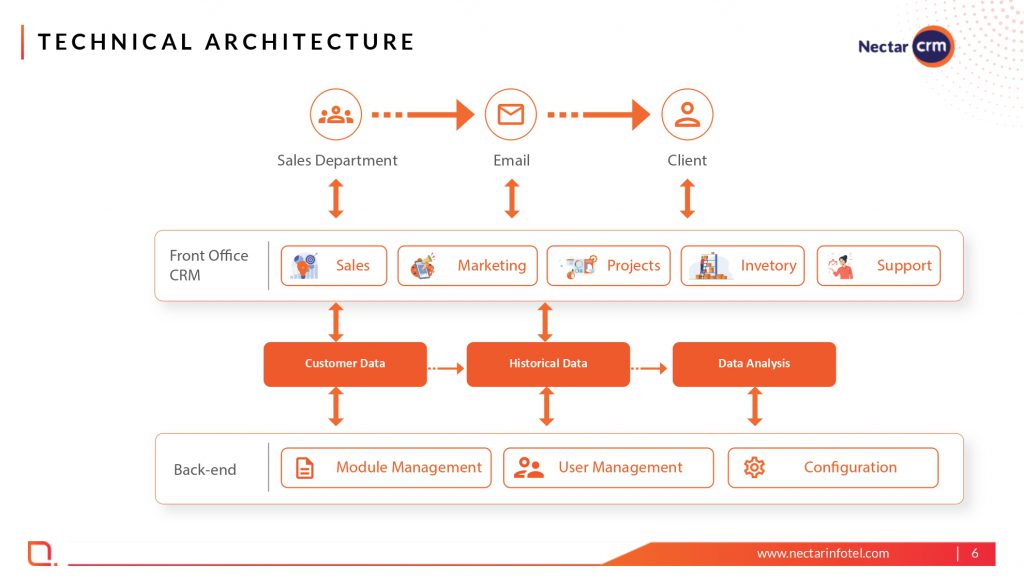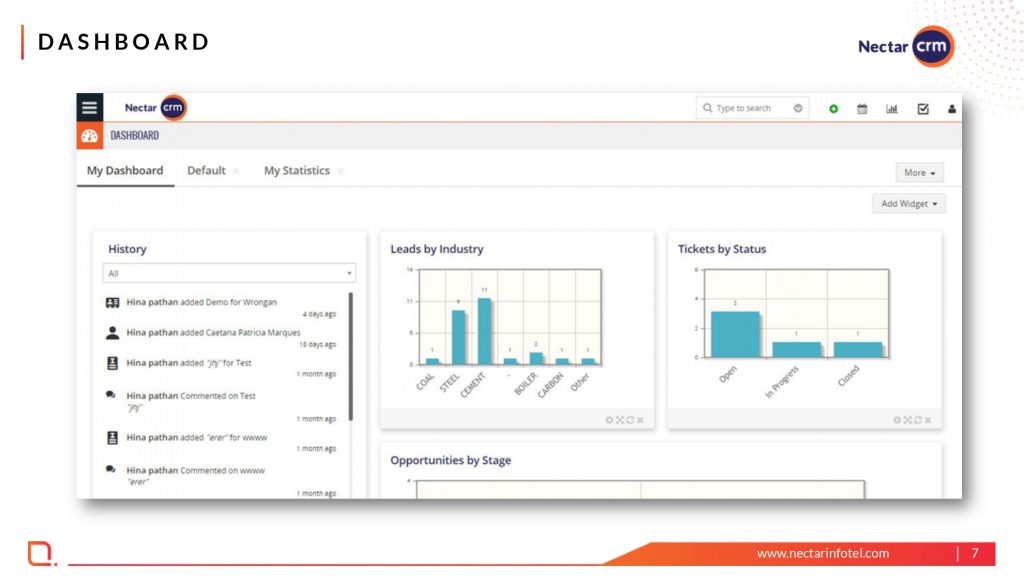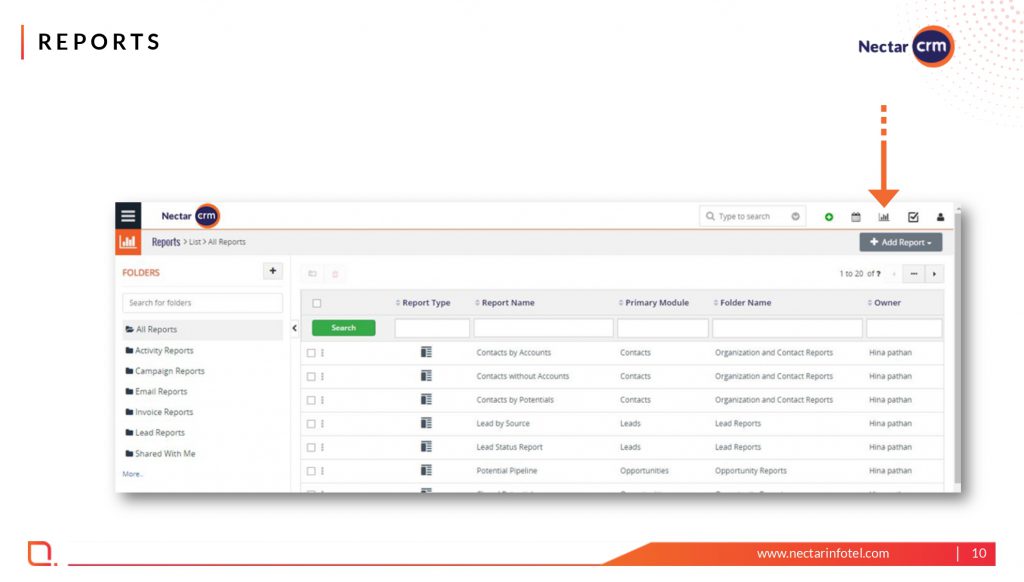Ready for a CRM Software that actually works for your Business?
If you are reading this blog, you have probably never used a CRM Software. Maybe you have heard the term CRM before, but are unsure about how it works and what do you really do with it?
Let’s make it simple, a CRM or a Customer Relationship Management System makes business operations easy, helps them run smoothly, and drives sales growth to a new height. But how? Let’s get into that then!
- What is a CRM?
- How does a CRM work?
- What are the benefits of a CRM system?
- What does a CRM Dashboard look like?
- How do you choose CRM Software?
- Who needs a CRM?
- What’s next?
1. What is a CRM Software?
A CRM, or Customer Relationship Management, is software that manages customer relationships. CRM software keeps track of all customer-related information.
Any interaction, customer feedback, or information about a potential customer. All of this information is stored in a centralized database that multiple people within the same organization can have access to that.
However, a CRM system does more than just manage data; it also simplifies sales, accounting, customer service, and management for business owners.
2. How does a CRM System work?
The primary function of a CRM system is to collect and manage data. In short, the system allows employees to track every information of a potential customer.
From the very first level of interaction to the very end of a business a good CRM strategy plays an important role in data collection, tracking, and analysis. For example, with the access to information, employees can recognize the unique requirement of the customer and can turn the leads into conversion, resulting in building customer trust and client base.
A CRM software integrates customer data and smoothens the process of sales, marketing, and support service in an all-in-one system. CRM automates customer interaction and enhances communications.

3. What are the benefits of a CRM system?
Now that you know what a CRM system is and what it does, let’s go over its benefits. Now, the most crucial part of a business is leads and conversion. How will a CRM system help with that? By keeping track.
The biggest solutions a CRM provides are –
Data Tracking:
A CRM software tracks all types of leads and listings and organizes them in an easy-to-understand format. Updates the status of leads step by step and streamlines the communication process.
Enhanced Customer Service:
Modern CRM tools are excellent at maintaining customer relationships. The tool can save customer contacts as well as relevant information such as gender, demographic, purchase records, and message history across multiple channels. Also, it makes it available to anyone who requires it.
Communication Management:
CRM manages and keeps records of every step of interaction with customers. From phone calls to emails, a CRM tool tracks everything. Therefore, employees know from which step they should reach out to the prospect and their choice of action. This historical record tracking ensures time-saving and improves productivity.
Automated Sales Reports:
Every CRM solutions has an interactive dashboard and extensive reporting features. Employees can automate sales reports on prospects and existing clients. It also helps in performance evaluation, project status tracking, and many more.
Centralized Database:
A very useful and important feature of a CRM system is its centralized database. It is accessible to anyone in the company who needs it. For example, a sales rep needs to see what services a particular customer is interested in, they can go through the CRM system and understand at what stage the customer might be in, their history of interaction with the company, and take required actions accordingly.
Sales Growth:
CRM saves time by streamlining the sales process as a whole. From automating key tasks to analyzing sales data and ultimately increasing sales and productivity. Above all, a CRM assists you in developing a step-by-step sales process that your employees can rely on and that you can easily tweak as problems arise.
4. What does a CRM Dashboard look like?

5. Who needs a CRM Software?
CRM solutions are required by all businesses to increase business value, efficiency, and profits. Here is a list of some well-known businesses that require CRM:
- IT Companies
- Real Estate Businesses
- Logistics Company
- Manufacturing Companies
- Financial Institutions
- Healthcare Industry
- Insurance Companies
Maintaining a good customer relationship is essential to the success of any business, regardless of industry. CRM can help you respond to queries quickly, be available 24 hours a day, and provide regular updates.
6. How do you choose CRM Software?
Start by defining your business goals:
CRM software can be used for a variety of objectives, so it’s important to figure out what problems you’re trying to tackle with it. CRM is used by almost all firms to achieve the following objectives:
- Tracking Leads and their activities
- Storing customer information
- Managing connectivity between teams
- Storing historic customer data
- Custom reporting
It’s critical to identify specific business goals and follow a well-thought-out strategic plan, such as what measures should be taken and how to proceed with the help of a CRM system.
Communicating with team members, from sales to customer service, to determine how the system may help them manage their data and client interactions.
Identifying required features for your business:
Each CRM has its own set of features and integration processes. Its functions can cater to a variety of business requirements, including:
- Lead Management
- Contact Management
- Marketing Automation
- Reports & Analytics
- Sales Forecasting
- Campaign Management
Any company’s main goal is to make the sales funnel process as simple as possible. Creating awareness to pique interest, which will eventually lead to action. The best option is to choose software that meets your company’s needs while also making your team’s work easier.
Understanding the product Demo:
CRM software is a long-term investment because it infiltrates all parts of sales, marketing, and customer service.
Before acquiring the software, it is critical to comprehend the product demonstration. This is your chance to put the program to the test and discover how well it meets your company’s demands. Frequently, organizations do not use the free version of the software because of this, they are unable to determine whether it meets their needs.
Adaptation of CRM Software:
Adapting to new software and adjusting to its functionalities can be challenging for your team. The key here is to provide ownership to your employees and train them on how to properly make use of features and functionalities.
Even though there are no outside implementation expenses connected with CRM software implementation, there will still be costs associated with training your workforce and putting your data into the new platform. Implementation can entail significant expenditures and divert time away from your team’s present responsibilities; therefore, do not underestimate the effect of implementation.
Reporting with CRM System:
CRM includes a lot of reporting tools, which is why you may utilize it to set yourself apart from the competition. There are alternatives for creating personalized reports that highlights your specific revenue, loss, and areas for improvement. Your plan may appear to be effective, but the final results are determined by your data.
With a sales team on board, it will be easier to enter accurate data and generate the necessary report.

What’s next?
Choosing the right CRM for your company is a critical and time-consuming task. As you begin your CRM investigation, the factors listed above might assist you in making decisions. Similarly, you’ll want to make sure you select the greatest CRM software for your business model, as the correct CRM software will be critical to your company’s success.
Nectar CRM could be a terrific way to integrate automated workflow into your business processes and boost total sales.

Leave a Reply